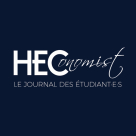01.06.2022
Special Report 95 > Future of Work: the Skills of Tomorrow.
HEConomist: the future as seen by future workers
What if we could predict the future? The work force is once again at a crossroad. No steam engine this time, but a simple laptop and a virus that make workplace possibilities both infinite and unpredictable. Nevertheless, a prediction can be sketched by asking those who will be the main actors of the future of work: the students. We interviewed them and here are their answers.
Video in French
Major changes: digitalization, automation... amongst others
When sharing their vision for the future of the working world, a theme that is just as recurrent as it is obvious among students is digitalization. The automation of many jobs, even sectors, is perceived as a threat. Many worry about their own competitiveness in the face of job-destroying machines and software, and fear having to "hyperspecialize" to remain competitive. Others, on the other hand, see this phenomenon as an opportunity allowing for an unprecedented ease of retraining and ease of working.
Teleworking and well-being
One subject that comes up in every answer is teleworking. Inevitable for almost two years now, it is favored by many students. Working remotely offers a flexibility that will certainly remain in the future. However, there are also many who wish to impose restrictions on it due to the separation of private and professional spheres, which is a core expectation for many students. Working face-to-face would also allow for better training and integration of future employees.
Working remotely is therefore part of a larger desire for flexibility. Chose your working hours, get a performance related pay… The future of the daily nine-to-five is up for debate. The idea of a calm and harmonious work environment is widely shared and is becoming more and more of a prerequisite. However, be careful not to confuse well-being at work with laziness: this desire is to be understood rather as a change of priorities. It is true that we must work; but we work to live, not the other way around.
Competitiveness, public enemy no. 1...
When asked "how will the workplace evolve in the next 10 to 20 years", almost all students answer: increased competitiveness. This is related to automation and its negative connotation, even though more and more candidates have a university degree. The future generation of workers is faced with fears of unemployment and doubts that their degree will be useful when the time comes.
… And equality, public friend of the same number
In this logic, students advocate for a hiring process that values potential as much as experience. Most importantly, they are calling for more equality between genders, origins, and religions, both during and after the job interview. For this generation, it is time to put an end to all kinds of discrimination once and for all. Everyone should come to work with a smile on their face - except maybe on Monday mornings. And all should leave in the evening with that same smile and an intact dignity.
We then asked students about one of the main dynamics of the labor market. Today, people change employers and fields more often than ever before. The main cause, according to the majority of students interviewed, is an increasingly dynamic world and new challenges to which one must constantly adapt. Personal motivations, such as the search for better working conditions, better pay or new challenges, are other influencing factors. This is also accentuated by the ease of retraining due to an educational system that allows for easy reorientation.
It is important to note that most students recognize themselves in this dynamic. This trend is likely to continue, even if a significant proportion (about one-third) of those surveyed do not recognize themselves in it.
What about HEC Lausanne in all this?
The courses taught at HEC Lausanne will undeniably be impacted by all these developments. Many students agree on the need to accentuate the teaching of certain skills, such as adaptability - cited by half of the students - and soft skills (communication, listening, leadership, etc.). Technical skills linked to computers and new technologies are still omnipresent in the answers we collected. Many students also mentioned sustainable development in their answer. While few of them anticipate it to be a major factor of change in the future of work, many agree that the Faculty should prepare future students with an increased knowledge of environmental challenges. The new E4S program, which reflects the desire of HEC Lausanne to adapt to the new challenges of the job market, is a good step in this direction.
Unsurprisingly, entering the work force remains a process full of anxiety for the majority of students. Most worry about their lack of professional experience, and especially about the competition. Not very reassured, some sentences come up often in their answers. "We all have the same business degree anyway" say many of the future alumni of HEC Lausanne. Would our Faculty benefit from working on its brand image?


